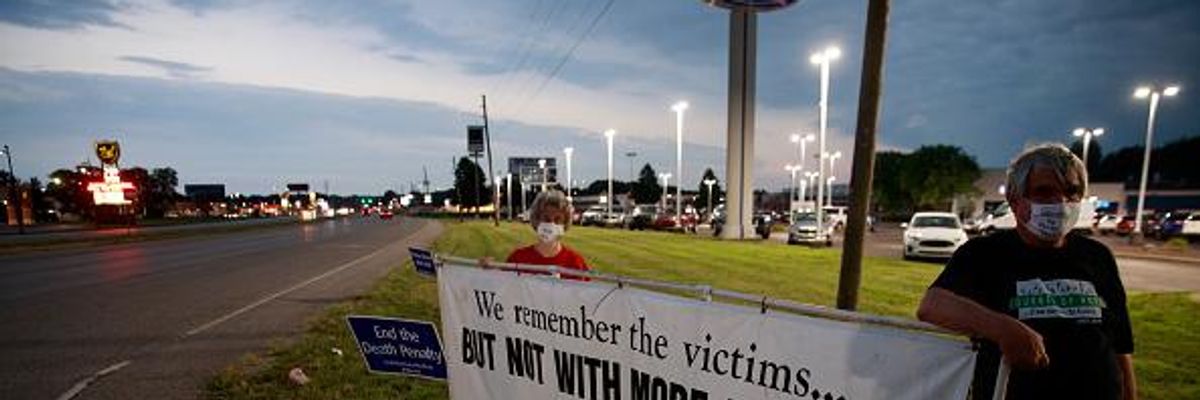With Wednesday's federal execution of Lezmond Mitchell, the only Native American on federal death row--and killed despite objections from his Navajo tribe and the victim's family--the Trump administration has now carried out more capital punishment in 2020 than "in the previous 56 years combined," according to the Associated Press.
Several Native American writers from multiple nations explained ahead of the federal execution that killing Mitchell would constitute a violation of tribal sovereignty and called on President Donald Trump to commute his death sentence, to no avail.
Prior to the execution of Mitchell, Death Penalty Action, an organization seeking to abolish capital punishment, highlighted the grim threshold that President Trump was approaching, as he was on the verge of becoming the "'most-executing' president since the 1950s."
Last month, the Trump administration--thanks to the right-wing U.S. Supreme Court's decision to lift injunctions granted by U.S. District Judge Tanya Chutkan in Washington, D.C.--resumed federal executions for the first time since 2003.
"Wouldn't it be great if the federal government focused on stopping the Covid-19 pandemic instead of executing death row prisoners for political reasons?"
--Sister Helen Prejean
Daniel Lee, Wesley Purkey, and Dustin Honken were executed over the course of only four days in July.
Hours after Mitchell became the fourth prisoner killed by the federal government this year, the execution of Keith Dwayne Nelson, scheduled for Friday, was halted on Thursday by Chutkan. The judge said the law requires the government to get a prescription for pentobarbital, the drug it intends to use in the execution.
As Common Dreams reported last month, the lawyers for Nelson "have argued that the pentobarbital protocol violates the Eighth Amendment's ban on cruel and unusual punishment." The Justice Department is appealing Chutkan's decision.
With two additional federal executions planned in September, the Justice Department's enthusiasm for pushing through federal executions this summer has provoked criticism of the Trump administration's decision to kill inmates amid the Covid-19 crisis.
"This record-breaking string of back-to-back executions occurs during a global pandemic," wrote Cassandra Stubbs, director of the ACLU Capital Punishment Project.
Stubbs went on:
In all three executions carried out so far, the government sidestepped due process, public health recommendations, and legal precedent in its rush to kill. In flouting these important procedures, the government is treating human lives--and our laws--like they don't matter. This should raise serious alarm.
The consequences of the government's rush to execute will not only affect those on death row. Executions are potential super-spreader events during the Covid-19 pandemic, involving the travel and congregation of hundreds of people from across the country. That the government is choosing to resume federal executions now--at a time when much of our daily lives have ground to a halt--shows an alarming disregard for the lives of all involved, in addition to the inhumanity and the disturbing lawlessness of the capital punishment system.
"This raw abuse of federal power to end human life comes at a time when most of the nation is moving away from capital punishment," added Stubbs, who described the death penalty as "a broken system from start to finish, global pandemic aside."
The Trump administration's revival of federal executions in 2020 has generated renewed calls to abolish the death penalty, a practice which Stubbs argued "dehumanizes all of us" and has "less to do with the severity of the crime than with race, access to quality counsel, and the state or even county in which the crimes were committed."
In a series of tweets on Wednesday, anti-death penalty activist Sister Helen Prejean also called attention to what she described as the "national scandal" of a "lawless death penalty process" that has "nothing to do with justice" but "is a political show of force by an administration that is an habitual offender when it comes to the abuse of power."
"Wouldn't it be great if the federal government focused on stopping the Covid-19 pandemic instead of executing death row prisoners for political reasons?" Prejean asked.
"There's never been a better time for America to end this failed experiment," added the ACLU's Stubbs.

